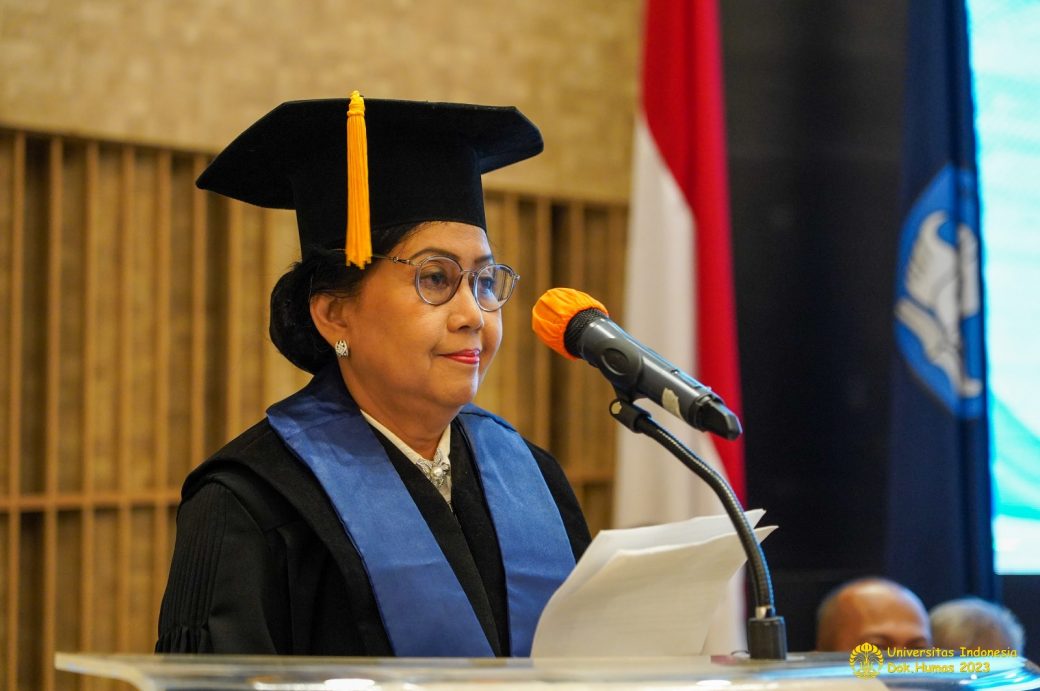Universitas Indonesia (UI) confirmed Prof. Dewi Tristantini, Ph.D., as Permanent Professor in the Field of Herbal and Cosmetic Sciences, Faculty of Engineering (FT) UI (Wednesday, 5/7). The inauguration ceremony was led directly by the Chancellor of UI, Prof. Ari Kuncoro, S.E., M.A., Ph.D., at the Makara Art Centre (MAC), UI Depok Campus, West Java.
In his inaugural speech, Prof. Dewi explained how the world’s biomass can benefit anyone and encourage progress in the herbal and cosmetic industries in Indonesia. He said biomass is a term used to refer to all organic materials originating from cultivated plants both on land and at sea, as well as all organic waste that can be used as a source of raw materials for the food industry, herbal medicines, cosmetics, and others.
“Biomass is very good for meeting the needs of the Indonesian people because raw materials are very abundant around us due to Indonesia’s biodiversity, which is among the top ten in the world.” The utilisation of this abundant biodiversity can create innovative, renewable organic materials that have the opportunity to replace synthetic materials that are less environmentally friendly,” said Prof. Goddess.
The abundance of biodiversity and Indonesia’s location as a tropical area give Indonesia a great opportunity to exploit its abundant natural resources. From generation to generation, the use of herbs or biomass was studied and recorded, which later became an important basis for traditional medicine. Prof. Dewi said that herbal plants can be used as medicinal and cosmetic ingredients because they contain efficacious bioactive compounds called phytochemical compounds. Until now, there have been around 9,000 types of phytochemical compounds identified, but only about 200 have been used for health and beauty.
Modernization of the development of herbal and cosmetic products made from biomass requires rational scientific assistance, one of which is experimental computing. Through this experimental computation, it will provide several benefits, namely, in the form of supporting scientific evidence of drug efficacy. Second, in the form of high economic value or competitiveness from production, the herbal and cosmetic industries made from this industry can play a role in a society that continues to grow.
Prof. further Dewi said that the In Silico method with molecular docking simulation technique is a way to predict interactions between medicinal compounds or phytochemicals (ligands) and target proteins in the form of enzymes or receptors. This is to find out the efficacy of the drug or phytochemical before laboratory analysis is carried out. To predict drug efficacy in the In Silico method, various enzymatic reaction equations are used.
Besides that, Prof. Dewi also added that a production simulation (SP) of herbal medicines needs to be carried out to determine their economic competitiveness or viability. Industry programmes such as Aspen Technology and Superpro Designer are used to predict the cost of producing herbal medicines and cosmetics so that their commercialization is following the results of the In Silico method testing.
From the research that has been done, Prof. Dewi has produced three herbal medicinal products and one cosmetic ingredient, which are produced in limited quantities. The results of these innovations include Jamu Versatile Bancar Resik (SGBR), which is a herbal medicine to prevent or reduce atherosclerosis; Herbal Medicine for Nerve Tension (TTS), which is a herbal medicine to prevent or relieve pinched nerve pain (Trigeminal Neuralgia); Connection Juice and Leaf Extract Capsules, which are high antioxidant herbal products; and scrubs made from Cellulose Acetate from Empty Palm Oil Bunches (EFB), which are environmentally friendly.
According to Prof. Dewi, in developing herbal and cosmetic products made from biomass, the directions and steps to be taken must be clear and comprehensive. Starting from tracing empirical evidence through historical facts and community culture, laboratory testing of medicinal and phytochemical properties, and initial product development through In Silico efficacy simulations and production process simulations, to achieve highly competitive industries that are attractive to economic actors. “Above all of that, there are more urgent things to be improved by all of us, namely the downstream results of research by lecturers in tertiary institutions that are real, measurable, and have an impact,” said Prof. Goddess.
Prof. Dewi completed her bachelor’s degree in Chemical Engineering at Gadjah Mada University in 1984. Then she earned her master’s degree in 1994 at the Bandung Institute of Technology (ITB) and graduated with her doctorate at Chalmers University of Technology, Goteborg, Sweden, in 2006. Some of her scientific works are in the last few years, namely the Feasibility Assessment of an Encapsulated Longevity Spinach (Gynura procumbens L.) Extract Plant in Indonesia (2021); the Antioxidant Properties Assay of Gynura procumbens L. Fresh Juice at various shelf-life times using the hydroxyl radical scavenging method (2021); and the Acceptable Shelf Life of Indonesian Anti-Atherosclerosis Mixed Herbs Based on Bacterial Count and pH Stability (2020).
***
Bureau of Public Communications
Faculty of Engineering, Universitas Indonesia

